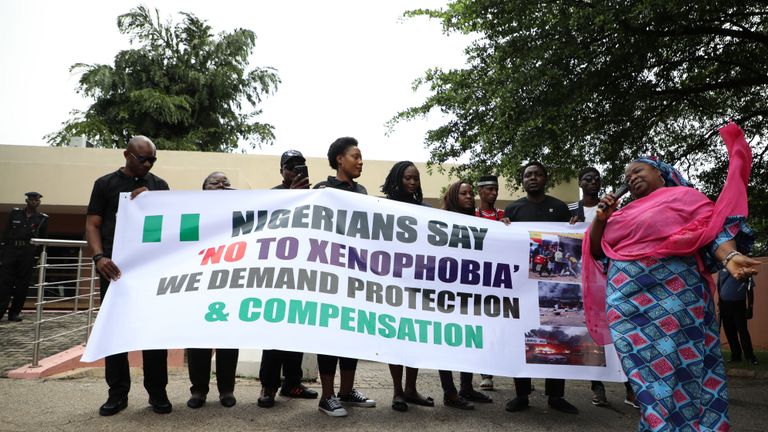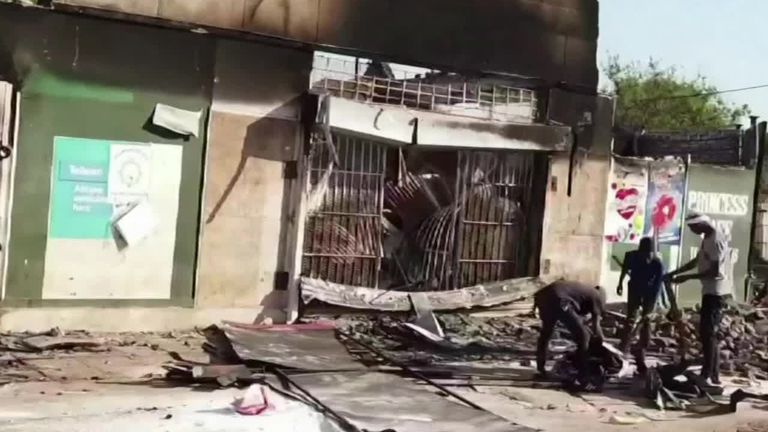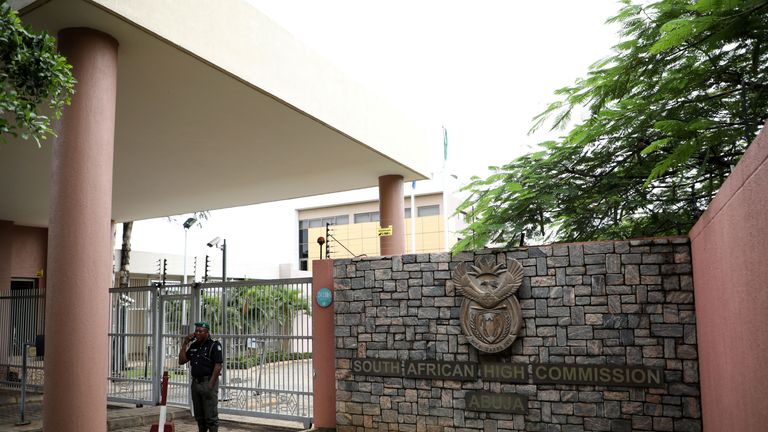South Africa shuts its embassy in Nigeria amid violent protests
Nigeria has also confirmed their ambassador to South Africa will be recalled in what is becoming an escalating diplomatic row.
Thursday 5 September 2019 17:32, UK
South Africa has closed its embassy in Nigeria as tensions between the two nations rise following xenophobic attacks in Johannesburg.
The diplomatic escalation comes after South African businesses, including telecoms giant MTN and supermarket chain Shoprite, closed stores in Nigeria after coming under attack from rioters.
Lunga Ngqengelele, a spokesman for the Department of International Relations and Co-operation, said the embassy was closed over fears for staff safety, but that the High Commission has not suffered any damage.
Civil unrest began in South Africa, with xenophobic violence against immigrants and foreign businesses. At least 15 people are reported to have been killed, and 423 people suspected of being involved in the attacks have been arrested.
Earlier this week, violence and looting began in Nigeria and Zambia in retaliation, as rioters targeted South African-owned businesses.
Witnesses say they saw vandals in Nigeria smashing into the offices of MTN - and in Zambia, students marched to South Africa's embassy in the capital of Lusaka.
Riots have spread to the Democratic Republic of the Congo's second-largest city Lubumbashi, where protesters have gathered outside the South African consulate and looted a South African shop, according to witnesses.
Meanwhile, police in South Africa say they have found two burnt bodies in the township of Katlehong, but cannot immediately link the incident to anti-immigrant violence.
Speaking at the World Economic Forum on Africa summit in Cape Town, South Africa's foreign minister Naledi Pandor said the government was aware of the anger driving the violence.
Ms Pandor added that the government was working to restore calm and that the South African and Nigerian governments were in contact with each other.
She said: "There is a targeting of Africans from other parts of Africa, we can't deny that, but there is also criminality... because a lot of this is accompanied by theft."
The violence in South Africa has been partly blamed on high unemployment rates, leading to growing tensions between foreign and South African workers.
South Africa currently has an unemployment rate of 29%, meaning almost seven million people are out of work. In comparison, the UK has an unemployment rate of 3.9% - an estimated 1.3 million people.
Foreigners are also being accused of pushing drugs into South Africa.
Cyril Ramaphosa, South Africa's president, condemned the violence - saying in a series of videos on Twitter that there was "no justification for any South African to attack people from other countries".
He said: "The attacks on people who run businesses from foreign nationals - it's something that is totally unacceptable, something that we cannot allow to happen in South Africa... something that is completely against the ethos that we as South Africans espouse."
Celebrities are also calling for a boycott against South Africa, with Afrobeats musician Burna Boy, best known for working with the likes of Beyonce and Lily Allen, urging fellow Nigerians to protect themselves.
Zambia's national football association has also cancelled a planned friendly due to be held against South Africa in Lusaka.







